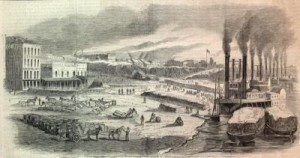Memphis has now been under Union control for over a year, the city serving as a strategic point on the Mississippi for the United States Army. From the beginning of the war Tennessee was a divided state, and the occupation of Memphis is welcomed by many residents of Union sentiment.
This week the one remaining active local Baptist church holds a “Ladies Fair” to help pay the pastor and retire the debts of the congregation. The Memphis Bulletin, a Union sympathizing newspaper, reports on the fund raiser in favorable terms.
This exhibition for some cause has been poorly attended. We cannot attribute the lack of interest in this praiseworthy movement of the Christian ladies of your community, to anything other than ignorance on the part of citizens of the existence of such a thing as Baptist Fairs. Indeed, we were told by Mrs. Grant, one of the principal leaders in this most benevolent enterprise, that many of the citizens had told her when interrogated, why they did not patronize the Fair, they knew nothing of it. Besides the weather, since the opening of it, has been most inclement and the impossibility of procuring any music may also have worked against it. Now, we wish it distinctly understood, by every reader of the Bulletin, not only that there is such an institution as the Baptist Ladies’ Fair, but that is so far as the collections and articles on exhibition are concerned, a decided sucess. We have visited many fairs in our life, but have yet to see one that will excel this in beauty of selection or variety. The tasteful arrangement and splendid decorations are a great credit on the heads of the tables. Wednesday evening, the commencement of the Fair, it was impossible to procure any music, the weather was unfavorable, the attendance slim, and the consequence was that but about $100 were realized-barely enough to pay expenses. Thursday evening, owing to the inclement of the weather, the attendance was but tolerable, the music promised did not come, and though the visitors were unusually liberal, the ladies realized but about $200. To-morrow–Saturday evening–a Colonel of one of the regiments stationed in the city, proposes to have at the Hall one of our splendid brass bands, and Mr. Conway hopes to be able to present new and interesting attractions. The object is a benevolent one–to support the pastor of the church, Mr. G.W. Lancaster, and to liquidate an outstanding debt on the church. We invite our citizens to attend to-night, and show by their presence here that they feel an interest in the cause of Christianity. This denomination have suffered severely since the war by the loss of three churches—one burned on Beal street-one demolished at Fort Pickering–and one is occupied as a hospital, leaving only this one in the city.
The committee of arrangements are, Mrs. N. H. Stont, Mrs. Geo. Grant, Mrs. Wm. Bruce, Mrs._____Zent, _____Armstrong, Miss Mary Zent, Miss Mollie Eanis, Miss Annie Coolidge, Miss______Coolidge, Miss. J. Wolf, Miss E. Curtis, Miss Emma Curtis, Miss Betty Taylor, Miss Fanny Hoope, Miss Mary Hoope.
As alluded to in the article, the city’s First Baptist Church is now an army hospital. The author is not clear as to the identity of the church holding the fair, but it may have been the Eudora Baptist Church, which is later appropriated as an army hospital.
Sources: “Baptist Ladies’ Fair,” Memphis Bulletin, October 23, 1863 (link); Albert W. Wardin, Jr., Tennessee Baptists: A Comprehensive History, 1799-1999, Brentwood: Tennessee Baptist Convention, 1999, p. 209



